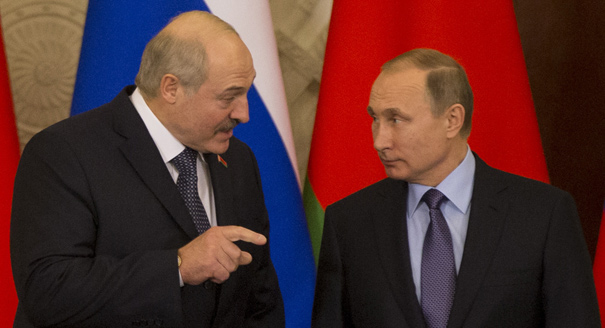In September, two members of the Belarusian opposition were allowed into parliament, an unprecedented concession from President Alexander Lukashenko’s regime, which has had almost complete control over the country’s institutions for the past two decades. Despite this show of liberalization, however, the West hasn’t rushed to reward Minsk; Western leaders have mildly praised Lukashenko but emphasized that plenty of problems remain and that the country needs to continue on a path toward democratization.
The United States extended its partial suspension of sanctions against nine Belarusian companies for another six months. The European Union lifted its sanctions against Belarus in February but hasn’t yet announced any additional steps. It’s been reported that the German Bundestag and the Polish Sejm may establish official contacts with the Belarusian parliament, and the European Parliament is scheduled to vote on the issue at the end of November. The EU has also initiated a dialogue with Belarus on removing trade barriers and has promised to enter into customs and energy negotiations.
All this dialogue is useful, but it won’t necessarily yield tangible results; Brussels is simply expanding the agenda for its talks with Minsk. EU foreign policy chief Federica Mogherini recently said that the EU is still not ready to start dialogue on a basic treaty with Belarus—something Minsk has asked for at all European forums over the past year and a half.
In other words, the United States and the EU haven’t appreciated Belarus’s minor liberalization as much as Minsk would like.
The West knows that Minsk lacks leverage. After all, it was Belarus that initiated a new rapprochement with the West when it stopped seeing Moscow as a reliable economic and political partner. Brussels and Washington can afford to demand more from Minsk now than they have in the past, which is why they are increasingly calling on Belarus to reform its electoral laws and impose a moratorium on the death penalty.
So far, the approach is working: Belarusian authorities keep making concessions to the West. They recently resolved two politically-motivated prosecutions by convicting the defendants but not sentencing them to jail time, and Belarusian law enforcement officials continue to refrain from arresting protesters at unauthorized rallies. At worst, activists are detained for a few hours and fined.
At the end of October, the Belarusian government even approved a National Action Plan for Human Rights, something only 40 countries in the world have done. The contents of the plan are extremely vague, allowing the government to abandon it if rapprochement with the West stalls. The regime simply wanted to demonstrate its commitment to developing its relations with the West by doing something that the West hadn’t even asked for.
The Eurasian vector of its foreign policy looks far worse for Minsk. The Kremlin views the Eurasian Economic Union (EAEU), of which Belarus is a member, through the prism of geopolitics, seeking to reassert its spheres of influence and create an alternative center of power on the continent.
Belarus’s interest in the EAEU, by contrast, is purely pragmatic. In addition to needing free access to the Russian market, Minsk is now trying to use the EAEU to avoid bilateral oil and gas talks. Belarus doesn’t want to have to fight directly with its dominant and increasingly intractable partner every time a contract is about to expire. Multilateral talks were supposed to take the emotion out of the negotiating process and make tariff-free gas and oil shipments at Russia’s domestic prices a permanent fixture, but they haven’t been successful thus far.
The Belarusians are particularly worried about negotiations with Russia in light of the latest oil and gas conflict with Moscow this summer and fall. When Minsk objected to Gazprom’s claim that Belarus owes it $300 million, Gazprom reduced gas shipments to the country. Lukashenko responded by escalating the conflict, threatening to remove the best Belarusian officials from the EAEU’s headquarters in Moscow.
But Russia didn’t give in, and many suspect that Lukashenko’s Westward drift may have been the reason why. All of a sudden, Russian health officials started noticing problems with Belarusian milk, which always goes sour when relations between the two countries do. We don’t know what was discussed behind closed doors, but when all was said and done, Russia had the upper hand: Minsk agreed to acknowledge and repay its debt, and the two sides agreed that gas prices will remain steady—and possibly decrease—in 2017.
Like its Western partners, the Belarusian regime finds Moscow less and less willing to compromise. Belarus can’t just up and leave the EAEU: though it is less dependent on Russian exports now in absolute terms as the economies of both countries contract, Belarus has no alternative to the Russian market in some spheres—especially industrial ones—and its government knows full well how the Kremlin, with its besieged fortress mentality, might respond to such threats.
With Minsk no longer able to get what it wants from its neighbors, the government is getting creative: recently, Belarus has hosted a number of conferences on “integrating the integrations,” thus making an effort to promote the idea of bridging the gap between the East and the West through cooperation between the EU and the EAEU.
In public pronouncements, Moscow is quite amenable to the idea. Vladimir Putin himself has mentioned a “Greater Europe from Lisbon to Vladivostok” several times. But it’s hard to imagine such integration in a climate of mutual sanctions, and Brussels doesn’t intend to launch an official dialogue with Russia without seeing serious progress on the Minsk Protocols.
The rhetorical effort that Minsk has put in promoting the idea of “integrating the integrations” for over a year will bear no fruit until the bigger powers resolve their problems. But Belarus’s outspokenness is a sign of Minsk’s growing fatigue with balancing the interests of its feuding neighbors, who increasingly neglect the small but demanding country wedged between them.
